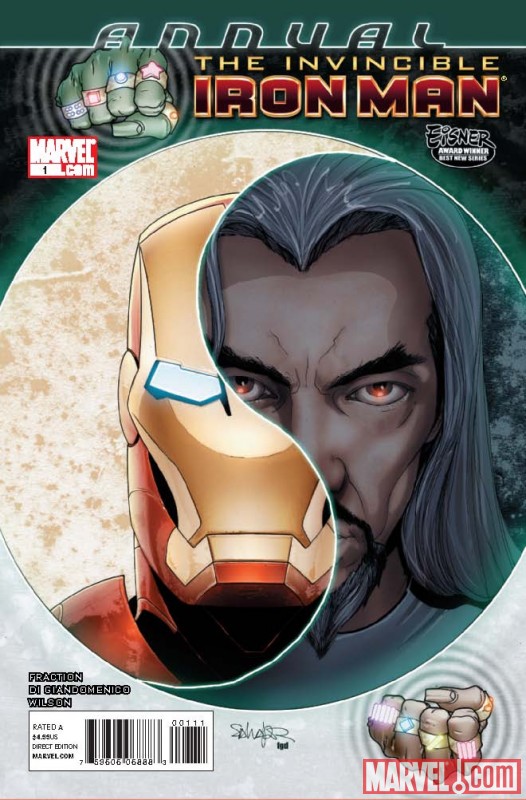 I really dug The Invincible Iron Man Annual #1. First and foremost, Matt Fraction here is at the top of his game- his hero is tragically brave, his villain is believably ego-maniacal, his story is dark and subtle, his facts are his fictions and his fictions are facts. All that, despite featuring one of the most flamboyant characters in comics- The Mandarin.
I really dug The Invincible Iron Man Annual #1. First and foremost, Matt Fraction here is at the top of his game- his hero is tragically brave, his villain is believably ego-maniacal, his story is dark and subtle, his facts are his fictions and his fictions are facts. All that, despite featuring one of the most flamboyant characters in comics- The Mandarin.It would be easy to play up the villain, easy to make him overbearing and long-winded but Fraction resists that temptation. Instead, he gives us a villain aware of his own past but unwilling to remember it or, perhaps more relevantly, willing to rewrite it. This may very well be a reference to Fraction himself- this is something that the writer does very well and to great effect, particularly in his run on Immortal Iron Fist from a couple of years ago (incidentally, the book is littered with Iron Fist references and call backs. I'm hopeful that this foreshadows Fraction's return to the character, at the very least in a limited capacity). More likely it's a reference to the way in which certain writers feel free to retcon a character rather than to reinforce core principles.* Either way, it's a vicious piece of plotting, and it hits its mark beautifully by reminding us that no man is the villain of his own story, even if he knows that he is.
In fact, The Invincible Iron Man Annual is, in almost every way, more of a long Mandarin one-shot than an Iron Man comic. Tony Stark (or, at least, the real Tony Stark) makes only one, brief appearance- in a flashback. This is why it's so odd that Marvel choose this comic to try same day and date retailing with- this is a damn good comic (in fact, maybe the best all year), but anyone who's been observing the business for any length of time realizes that quality does not necessarily lead to sales. Recognition leads to sales. Iconography leads to sales. Sure, people who know comics know The Mandarin- but would a guy off the street (or dude with an iPad) looking for something more after Iron Man 2?
It's not impossible, certainly, but it is extremely unlikely. Why this comic, then? There are plenty of other Iron Man comics they could have tried, plenty of others more likely to hold the interest of a casual comics fan.
I think this is the key. I don't think that they're aiming for the casual comics fan- I think the comics companies are looking to hook people who were already into comics into digital readers. It's the only thing that makes any sense. Otherwise, DC would have published Batman #700, Superman #700 or Wonder Woman #600 rather than that JLI comic they've started out with. Marvel would have begun with an X-Men comic, or an Avengers one. In fact, they might even be trying to hook people who think they've outgrown comics- people who would be interested in JLI or the Mandarin.
People who might not otherwise be interested in paying $5 for a comic book might be willing to read about a character they remember fondly at a much cheaper price of $2 for the beginning of the story.
I understand why the Annual cost so much- it's a big comic book, and the ads are relatively unobtrusive- but I bet if we did a page by page analysis we would find that it's actually relatively inexpensive for the amount of story- I'm going to guess somewhere around 45 pages?- that we actually get. Not only that, I'm glad parts of it are accessible cheaply; it's a damn good story, and I suspect that no one who buys the first third will be able to resist buying the rest. What I don't understand is why today's issue of Thor costs so much for a normal sized comic. Or why Marvel insists on putting those lame "oral history" pages in the back of new Avengers issues.
I have a theory, though. I think we're paying for respectability.
It's true that, in purely physically aesthetic terms, the quality of comics has shot up over the last 20 years or so. Higher quality paper, more colors, etc. Although we're also paying for those things when we buy a comic these days, I think what we're really paying for is the right to look at something that might be high art. Consider this- things that are considered "great art" have limited accessibility. Plays and classical music cost money. So do movies. Literature, until very recently, we severely limited by the number of people who were capable of reading. This has always been comics' problem- too many people had access. Too many people could appreciate them, so they couldn't possibly be fine art- except now they can be, because they're expensive. Because they aren't as accessible as they used to be.
I have no idea if this is actually true, and the thought clearly needs some development, but it's curious, isn't it? And what if I'm onto something? How does that change the way we, as comics readers and intellectuals, understand our passion?
---------------------
*Consider the differences between JMS's attempts at the former (Spider-Man) rather than the latter (Thor).
